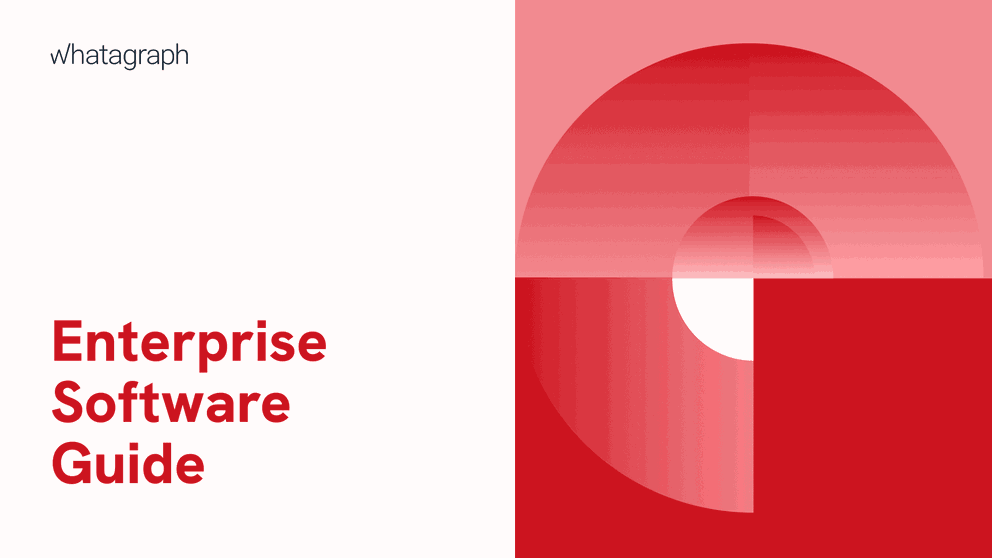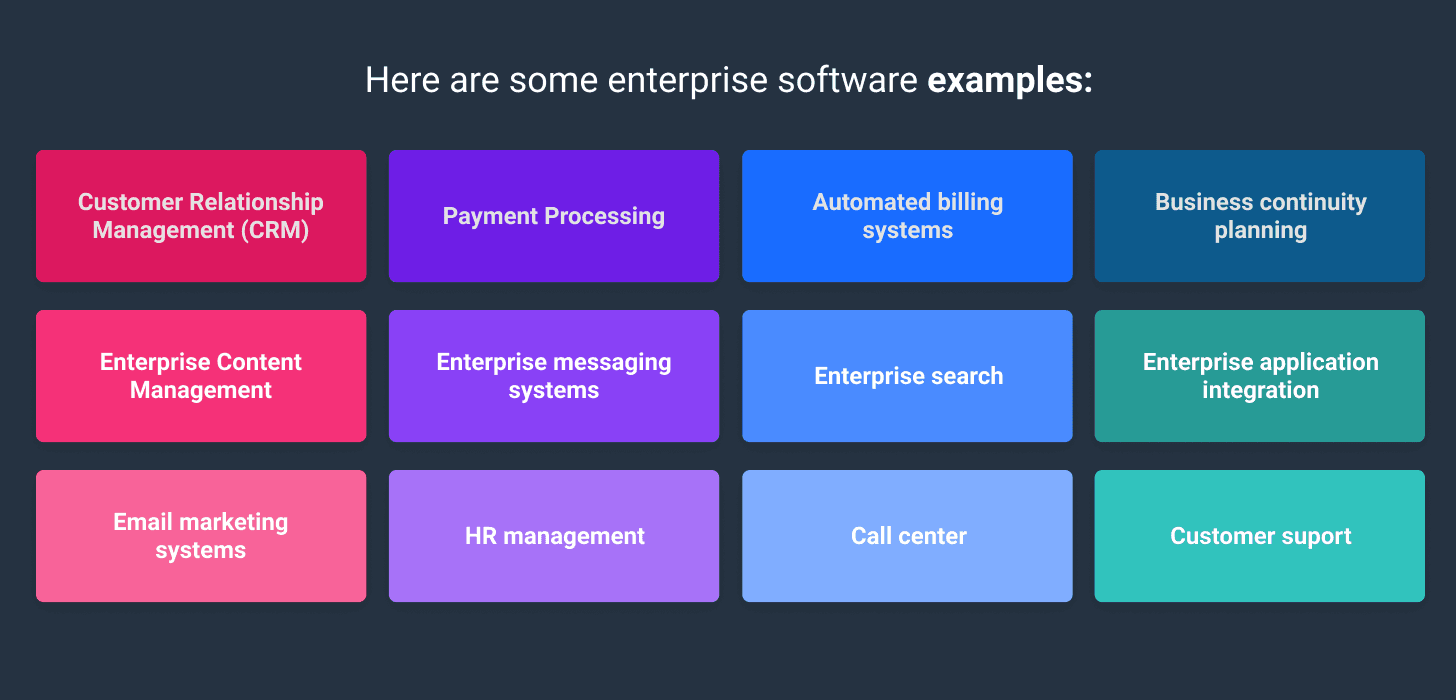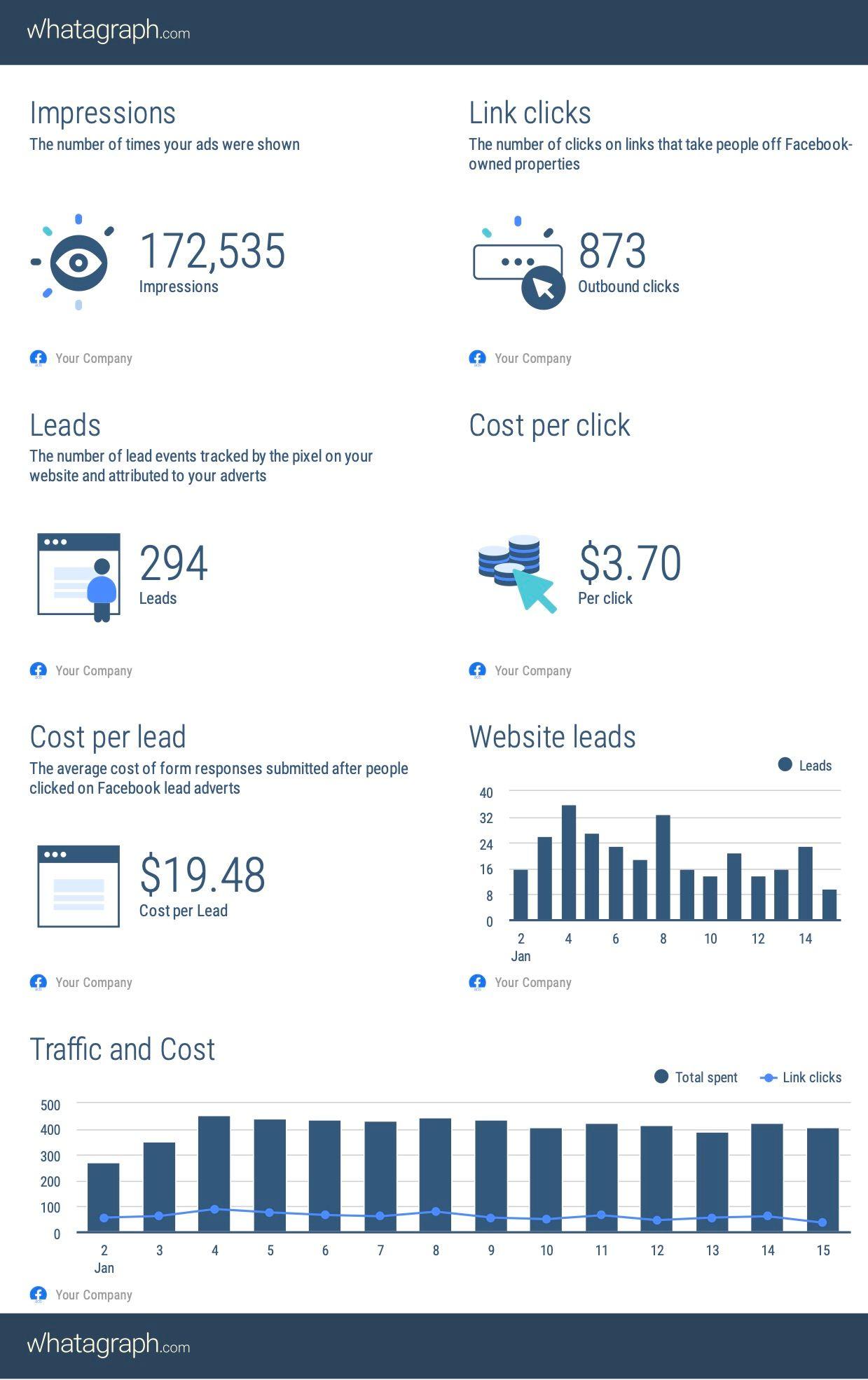7 Examples of Great Enterprise Software for 2024
The bigger your business grows, the more diverse your software requirements become. The best way to fulfill those requirements is by using software enterprise solutions: you'll accelerate your workflow and minimize human error.

Mar 26 2020●3 min read

However, it's vital to choose the enterprise software solution that suits your business: this way, you'll increase the visibility of your workflow, improve your bottom line, and optimize productivity.
Most of these solutions are known as business enterprise software. Some of them are dedicated to streamlining all processes and business units, such as customer relationship management or accounting software. You can integrate some of these tools to align with your requirements.
What is Enterprise Software?
Enterprise software companies provide products or services designed for organizations rather than individual consumers.
Does that sound simple?
When people mention the word "enterprises" in a discussion, they typically are referencing to large companies with an international presence. Usually, businesses that fall under this category possess unique software requirements that distinguish them from small businesses.
There are many enterprise software solutions that large businesses can access: this way, they can optimize operational productivity and improve your bottom line. A local pharmaceutical store should not have to manage global currency conversions.
Some vendors specialize in enterprise software development and design for companies in various sizes.
As a business, you should go for a system that aligns with your needs, especially the size and scope. Also by keeping an idea of the critical software, you'll spend less time going through options that are insignificant to your needs.
What is Enterprise SaaS?
Enterprise SaaS and enterprise software are slightly different, with the first being rented and hosted in the cloud. And, SaaS solutions are tailored to be multi-tenant: in other words, several enterprises are working on a single database.
Here are some enterprise software examples:

- Email marketing systems
- Automated billing systems
- Customer Relationship Management (CRM)
- Payment Processing
- Business Continuity Planning
- Enterprise Resource Planning
- Enterprise Content Management
- Enterprise Application Integration
- Enterprise Messaging Systems
- Enterprise Search
- Core HR Management
- Call Center and Customer Support
- Enterprise scheduling software
Top 7 types of enterprise software solutions
1. Customer Relationship Management (CRM)
Every business professional knows the pain of losing a potential customer at the very last minute. There will be times you forget to close a deal, upsell your customers, cross-sell, or advertise those new products to your existing customers.
That's where Customer Relationship Management (CRM) comes into play. CRM can be described as a contact list that possesses a brain: it supplies you with an indispensable overview of the exact position you are with your client.
CRM includes managing social media and customer support departments.
2. Observability and monitoring software
An observability platform is an enterprise software or suite of tools designed to provide a comprehensive view of the performance and behavior of complex distributed systems. It allows engineers to monitor and analyze system components, applications, and services in real-time and make data-driven decisions about optimizing and troubleshooting them.
It is designed to provide visibility into the internal workings of a system, including metrics, logs, traces, and events. It collects data from various sources, such as infrastructure, applications, and networks, and aggregates and correlates it to provide a holistic view of system health and performance. Typically it uses machine learning algorithms and advanced analytics techniques to detect anomalies and patterns in system behavior, enabling engineers to proactively identify and resolve issues before they impact end users.
Observability platform like Middleware is commonly used in modern cloud-native environments, where applications are distributed across multiple containers, microservices, and cloud providers. They are also used in DevOps practices to enable teams to collaborate more effectively and reduce the time to identify and fix issues.
3. Project Management Software
This type of software helps you communicate with colleagues working in different parts of the world. It allows setting deadlines or targets: this way, every team member will be updated and get the work done. For example, you may use ProofHub, Basecamp, GanttPRO or Zoho Projects – these are four of the most popular project management software.
4. Marketing Automation Software
As you begin to see your business growing, you'll need to automate your daily marketing operations. Communicating with each customer on a mailing list or responding to Facebook comments would take too much time.
That's where Marketing Automation Software solutions can help. These tools allow automating communication with your customers through SMS, email, social media, or digital advertisements. You can perform market segmentation: this way, you'll tailor specific solutions to different targets.
Marketing automation tools allow marketing teams to spend less time doing manual work. And it ensures marketing campaigns are launched on schedule.
If you're looking for a tool to make your daily marketing tasks more manageable, Whatagraph is here to help. Whatagraph was designed to build marketing data reports automatically and save hours of manual work.

5. Enterprise Resource Planning or ERP Software
ERP, short for Enterprise Resource planning, sources every module of your business and digitizes them. By doing it, it can establish a complex network between each module. This way, everyone in the organization is working using a single database that keeps updated information.
Besides, ERP ensures different enterprise software tools are running in sync, including CRM or project management applications. Some enterprise software examples that fall under this category are NetSuite and SAP.
6. Treasure Management Enterprise Software
The purpose of Treasure Management Enterprise (TME) is to keep you updated with every financial concern in your organization. It also helps to determine what actions are generating the most revenue.
TME software allows tracking and predicting the cash slow easier. And it helps manage debt, lets you calculate a budget for capital projects and investments.
Finally, TME ensures your operations align with compliance regulations.
7. Business Intelligence
Working in a dynamic business environment requires ensuring your data analytics meets the highest quality standards. You should also figure out your role in business: where you are currently, how you got there, and where you need to be.
Here's where Business Intelligence Software does its job: it extracts relevant data from different data sources. It then synchronizes the data and allows you to run queries, helping you generate actionable insights.
BONUS! Partner Marketing Software
If you’re looking for a new lead-generation channel with the highest ROI, you should definitely consider partner marketing as a part of your marketing mix. Your partners and customers can generate tons of leads for your business, especially when you offer them commission from sales. You can also partner up with affiliates who have their own niche websites or social media channels and can drive traffic to your online business.
In order to control the traffic flow, track clicks and leads, and make payouts to your partners, you would need a reliable partner marketing platform, such as Affise. Within a platform you can easily add new partners, expand your network and make these partnerships an ultimate ROI channel.

WRITTEN BY
Roberta AukstikalnyteRoberta is a content writer and editor who strives to share industry updates with her readers. Her professional background includes Public Relations and Customer Success.